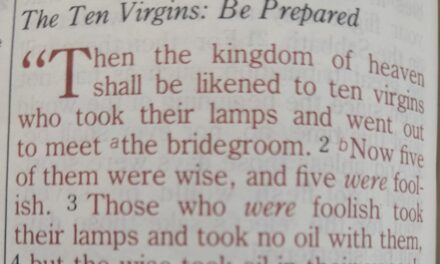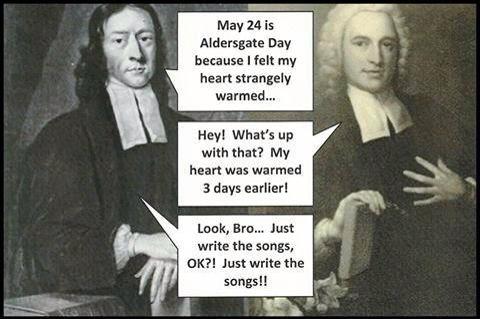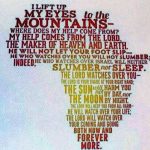No Circuit ever did, nor ever will, flourish unless there are bands in the larger societies – John Wesley, April 1788.
Today, September 24, 2025, marks the 183rd anniversary of modern Christianity and Methodism in Nigeria. The 183rd anniversary presents a mission opportunity to reflect on Methodism and the parable of the lost pieces of the band, as well as class meetings, as means of grace, renewal, and revival in World Christianity. Jesus’ parables of the lost sheep and the lost coins as earthly stories with heavenly meaning resonate with interest and concern to be found for the multitudes who are LOST in the Church; lost church members/leaders, lost in the very place where their presence should be a testimony concerning their salvation from sin (Lk 14). Judas Iscariot, a personal disciple and apostle of Jesus, got lost, did not continue in the grace of God, went into apostasy and died without hope. Simon the sorcerer lost his way when he thought of spiritual things in terms of money. Instead of repenting, he became an opponent of Christianity and fought it until death (Acts 8). If Judas can get lost, if Simon can get lost, any leader or denomination in today’s pluralistic world that fails to continue in the GRACE (God’s redemption at Christ’s Expense) of God can also get lost and go into apostasy.
Early Christianity, and especially Methodism, grew through conversion and discipleship, rather than just ceremonies and institutional politics. Methodism and the parable of the lost pieces of band and class meetings are about finding lost missional discipline and reassembling pieces of class and band meetings for Christian formation and leadership development. This equips and unites people in small groups, so that they are not lost in the flow and busyness of the Church maintenance. Methodism and the parable of the lost pieces of the band, as well as class meetings, aim to revive the lost practice of making disciples of Jesus Christ, thereby overcoming leadership insufficiency by identifying and revealing leadership graces and gifts in men and women for the work of the ministry.
Man and woman are created for a relationship with God. Methodism emphasises salvation that occurs in community, recognising that God’s purpose of salvation extends beyond individual efforts (Jn 3:16). The people called Methodists are followers of Jesus Christ, characterised by their participation and engagement in distinct small groups of weekly classes and band meetings. The groups have, from the beginning, proved to be the most effective means of discipleship and nurturing Methodists’ true fellowship in Christian experience. Classes and Bands reflect Methodism’s realism about being a ‘new creation’ (2 Cor 5:17). David Lowes Watson, in his The Early Methodist Class Meeting: Its Origins and Significance, says, “… there is little question that they became as skilled a group of spiritual mentors as the Church has ever produced. What Wesley looked for in a leader was a combination of disciplinary and spiritual discernment, so that fellowship in the classes would be a means of growing discipleship”
Methodism is about salvific economy. The classes and bands are shaped by the missional practice of Methodism’s twofold theology of salvation: being saved from wrath and being saved from sin. Classes were intended for those seeking belief, desiring to “flee the wrath to come.” Bands were for believers, who knew “the forgiveness of [their] sins” and had “the witness of God’s Spirit with [their] spirit that [they] are a child of God” (John Wesley, “Rules of the Band Societies,” in John Wesley, ed. Albert C. Outler [Oxford University Press, 1980], 180–81.
Methodism and the parable of the lost band, as well as class meetings, awaken us to the lost pieces that lovingly engaged Methodist people in conversations about their souls and encouraged them to discuss at a deep level what the Holy Spirit was doing in their lives. Methodist story, especially since the transition of John Wesley, has been shaped by controversies that ultimately divided the Methodist movement. In pursuit of the missional identity of Methodists as people of faith, spreading scriptural holiness across the land, the words of John Wesley are relevant for examining the priorities of Methodism today. Methodism became Methodists in name when we ‘discontinued the requirement of the class meeting and class leaders. The result was relatively short-term numerical growth, but also a decline in holiness needed to sustain missional vitality, which contributed to the subsequent waning in numbers and vitality experienced from the mid-twentieth century to today.’
Methodism globally continues to suffer a long downward spiral from its peaks of its first seventy years, marked by remarkable growth as a movement. The schism over human sexuality, the missional effects of the fears of John Wesley, among others, are not without declining and divisive theological, moral, legal, pastoral, and ethical impacts. The constitutional system of the church’s operations and accountability raises suspicions as a mechanism for maintaining power and control. Scott Kisker describes the decline of Methodism in his book Mainline or Methodist?: Rediscovering our Evangelistic Mission, “Real Methodism declined within our so-called ‘Methodist’ churches well before people stopped wanting to join them. Real Methodism declined because we replaced those peculiarities that made us Methodist with a bland, acceptable, almost civil religion, barely distinguishable from other traditions, also now known as ‘mainline.’ Methodism and the parable of the lost pieces of band and class meetings warns that Methodists have lost their missional foundation as it climbed to mainline church status.
Sadly, there is no quick fix to the decline and divisions in Methodism. Let us listen to John Wesley in his ‘Thoughts Upon Methodism.’ He wrote, ‘I am not afraid that the people called Methodists should ever cease to exist either in Europe or America; but I am afraid lest they should only exist as a dead sect, having the form of religion without the power. And this undoubtedly will be the case unless they hold fast both the doctrine, Spirit, and discipline with which they first set out. ‘
For Methodism to exist as a dead sect, having the form of religion without power suggests a loss of its life’s initial vigour, that is, the class and band meetings. The fear of John Wesley is the loss of the rich roots of salvation, disciple-making, and witness that made early Methodism so strong and healthy. The problem of Methodism is not money or building. The Methodist bishop of Yewa, Methodist Church Nigeria, Rt Rev Ayo Adeniyi, during the 2025 Council of Methodist Bishops in Abuja, warned against the tragedy of beautiful structures with empty pews and the need to ‘stem the tide of lukewarmness and stagnancy in our various dioceses.’ He said, “Can we ask ourselves, why has our Lazarus not risen as he did with the authority of Jesus? Many of the churches today are places of politics and policies, so designed to make good virtues dead because we lack God’s power. We tend to be so religious with no conversion experience, no encounter, but practices without the power of the Holy Spirit, beautiful structures with empty pews. How will he rise again? Have you ever considered the enormity of danger posed in the next decade by these beautiful structures and altars without the fire of God? It is the Holy Spirit that gives life; flesh is of no avail (John 6:63).” A past president of the Methodist Church in Britain, the Revd. Loraine Mellor, in her inaugural address on the current state of British Methodism, said, “My fear and my nightmare is that as a church we will decline so much we will go out of existence as Methodists, we will not have many people around, but we will be very rich as there are millions of pounds locked away in church funds. I fear that we are not being hospitable and generous with what we have. We are not using our money to enabling people to learn how to share Jesus. Our money is not paying for an evangelist, not funding a youth worker, engaging with the one program, having an intern, not serving the poor, not feeding the hungry, not sharing the amazing, wonderful life-enriching love of God, but moreover, not appreciating that everyone we encounter has something to offer as well.’ The reflections from these two leaders are not about a lack of building or money, but a summons to awaken Methodism to the need to recover its lost missional pieces, such as class and band meetings —a renewal that embodies the distinctive Methodist tradition of the apostolic and universal Christian faith. Another past president of the Methodist Church in Britain, Rev. Tom Stuckey, aptly explained the future impact of finding our lost pieces of band and Class meetings. He said, “Our future does not depend on upgrading premises, tinkering with structures, devising new strategies, either local or Connexional. We will have a future when presbyters drag themselves away from their computers and get out and talk to people, helping them to pray, discover God in the world, and talk about it. We will have a future when Methodists, who long to love God with all their heart, mind, and soul, feel the transforming power of the Spirit.”
The success of early Methodism was based on the success of class and band meetings, just as the decline of these meetings initially marked the decline of Methodism. Waddy Moss explained that ‘as more and more people joined the societies, it became harder to maintain discipline.’ Class and band meetings provided a solid foundation for Methodist growth, ‘in contrast to the success of Methodism without spiritual oversight and discipline.’ The reflection for us today is how the decline of class and band meetings, caused by the success and growth of Methodism, invites us to rediscover our lost discipline of the past. The decline of class and band meetings as proven and effective means of Christian formation led to errors in judgment and the appointment of inadequate Class leaders. In 1748, there were complaints that “the Leaders are insufficient for the work: they have neither gifts nor graces for such an employment.” Without the class meeting and class leaders, we lost the practice of how to “make disciples of Jesus Christ”; hence, “discipleship” has been reduced to ceremonies, occasional worship attendance, participation in programs, and financial support of the Church and its program offerings.
John Wesley said, “No Circuit ever did, nor ever will, flourish unless there are bands in the larger societies.” Beloved, no diocese, no conference, no district, no hierarchy, titles, policy and professionals will make Methodism flourish unless we recover the lost pieces of class and band meetings. For Methodism to be whole again, Jesus’ parable of the lost sheep and coins calls the Methodist people to humbly find the lost pieces of our class and band meetings shaped by the doctrine, Spirit, and discipline which we first set out. Sadly, we often feel lost, and at other times, we are unsure. For Methodism to find its lost pieces summons us to challenge leadership incompetence that resulted in the splintering of 19th-century Methodism and the present decline and divisions. The class and band meetings are missional gifts Methodism holds in treasure for the whole Church – yet she has not only forgotten, but she has lost these gifts. Jesus’ parable of the lost sheep and coins calls the Methodist people to resurrect and recover the class and band meetings, or else the fear of John Wesley will come to pass.











Recent Comments